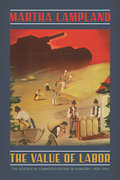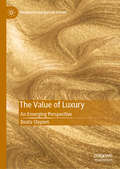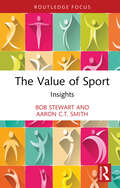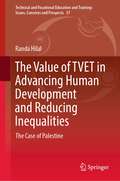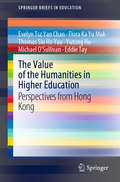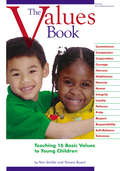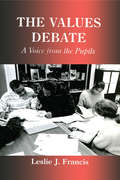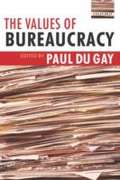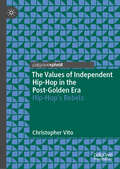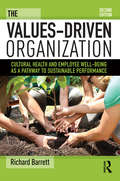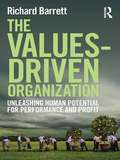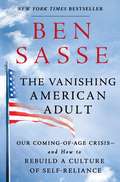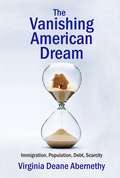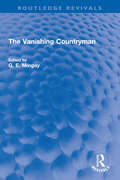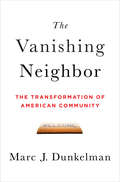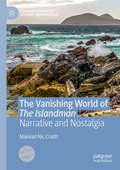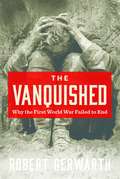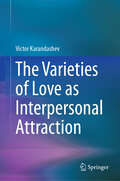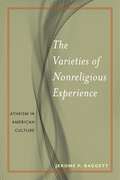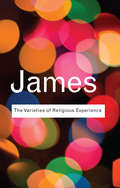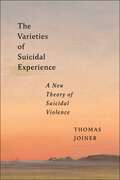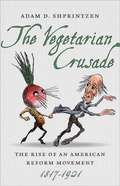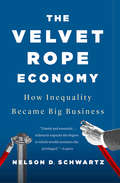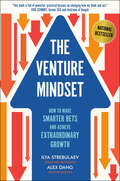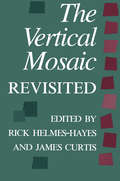- Table View
- List View
The Value of Labor: The Science of Commodification in Hungary, 1920-1956
by Martha LamplandAt the heart of today's fierce political anger over income inequality is a feature of capitalism that Karl Marx famously obsessed over: the commodification of labor. Most of us think wage-labor economics is at odds with socialist thinking, but as Martha Lampland explains in this fascinating look at twentieth-century Hungary, there have been moments when such economics actually flourished under socialist regimes. Exploring the region's transition from a capitalist to a socialist system--and the economic science and practices that endured it--she sheds new light on the two most polarized ideologies of modern history. Lampland trains her eye on the scientific claims of modern economic modeling, using Hungary's unique vantage point to show how theories, policies, and techniques for commodifying agrarian labor that were born in the capitalist era were adopted by the socialist regime as a scientifically designed wage system on cooperative farms. Paying attention to the specific historical circumstances of Hungary, she explores the ways economists and the abstract notions they traffic in can both shape and be shaped by local conditions, and she compellingly shows how labor can be commodified in the absence of a labor market. The result is a unique account of economic thought that unveils hidden but necessary continuities running through the turbulent twentieth century.
The Value of Luxury: An Emerging Perspective (Palgrave Advances in Luxury)
by Beata StępieńWhat does luxury value mean? What constitutes luxury, and what does not? While previous research has focused on luxury as a global business and how companies have generated, communicated and monetized luxury, this book draws on empirical research to examine how consumers understand and interact with it. It identifies the components of luxury value, as seen by consumers, and the most influential factors that shape these perceptions. Drawing on a range of disciplinary approaches, the author investigates how consumer segments differ in their perception of luxury products, and how different generations understand value. A comprehensive overview of consumer perceptions of luxury, this book is a must-read for those students and researchers interested in luxury studies.
The Value of Sport: Insights (Sport Business Insights)
by Bob Stewart Aaron C.T. SmithThis concise and thought-provoking book examines the myths and realities surrounding the value of sport. It asks a fundamental question: what is it about sport that leads to grand claims about its supposed capacity to do so many good things for society?Examining the evidence from sport around the world, at all levels, the book challenges the commonly held, uncritical assumptions about the value of sport. It looks closely at the claims that sport is likely to improve physical and mental health and social cohesion or that there are demonstrable economic benefits to local communities and positive legacy effects from international sporting events and elite athletic successes. Adopting a value-adding perspective, the book argues that governments and policy-makers must strip away the myths, be more critical in their thinking, and recognise the counter-argument that sport is also associated with negative effects, whether that’s the opportunity costs of allocating public funds to sport or the social harms for which sport can be responsible, such as drug use, violence, misogyny, racism, injury, or abuse. The book presents a broad-based framework for assessing the value of sport that focuses on citizen well-being, where a mix of collaborative public and self-organised regulation is used to help sport avoid becoming an infamous case study in market failure.Presenting fresh thinking on an important topic, this book is essential reading for anybody working in sport policy, sport governance, sport management, or wider public policy spaces.
The Value of TVET in Advancing Human Development and Reducing Inequalities: The Case of Palestine (Technical and Vocational Education and Training: Issues, Concerns and Prospects #37)
by Randa HilalThis book examines the contribution of Vocational Education and Training to advancing human development and reducing inequality. It uses the example of Palestine as case-study rich in multi-layered inequalities, some of which are experienced in the region and worldwide, while others are specific to adverse conditions. The case of Palestine provides fertile ground for understanding inequality and human development, and for echoing the developed knowledge through to the understanding of Vocational Education and Training and Human Development globally. The book brings original theoretical approaches, evidence of the value of Vocational Education and Training, and contributes to academic debates, as well as provides empirical evidence for practitioners and donor community.
The Value of the Humanities in Higher Education: Perspectives from Hong Kong (SpringerBriefs in Education)
by Eddie Tay Michael O'Sullivan Evelyn Tsz Chan Flora Ka Mak Thomas Siu Yau Yutong HuThis book presents an extensive analysis of the multifaceted benefits that higher education in the humanities offers individuals and society, as explored in the context of Hong Kong. Using both quantitative graduate employment survey data and qualitative data from interviews with past humanities graduates and with leading humanities scholars, the study provides an objective picture of the “value” of humanities degrees in relation to the economic needs and growth of Hong Kong, together with an in-depth exploration of their value and use in the eyes of humanities graduates and practitioners. Therefore, although it is hardly the only book on the value and status quo of the humanities worldwide, it nonetheless stands out in this crowded field as one of the very few extended studies that draws on empirical data.The book will appeal to both an academic and a wider audience, including members of the general public, non-academic educators, and government administrators interested in the status quo of humanities education, whether in Hong Kong or elsewhere. The report also includes a wealth of text taken directly from interviews with humanities graduates, who share their compelling life stories and views on the value of their humanities education.
The Values Book: Teaching 16 Basic Values to Young Children
by Pam Schiller Tamera BryantYoung children learn best by doing, and that includes learning values. The Values Book is packed with easy activities, projects and ideas to help children learn values and build character, both individually and in groups. Each chapter addresses one of 16 different values, including understanding, patience and tolerance. After defining the value, each chapter begins with questions to help adults clarify what that value means to them. The perfect book to introduce and strengthen the teaching of values in any early childhood classroom or home.
The Values Debate: A Voice from the Pupils (Woburn Education Series)
by Leslie J. FrancisPresents findings from a survey conducted among 30,000 13-15 year olds throughout England and Wales, giving particular attention to social, personal and moral issues.
The Values of Bureaucracy
by Paul Du GayFrom the introduction: "The demise of bureaucracy has been anticipated, and demanded, many times throughout the history of management thought, as well as in modern social and political theory. However, despite the scorn regularly heaped upon it, bureaucracy, both as an organizational ideal and as a diversely formatted organizational device, has proven remarkably resilient. Reports of its death have turned out to be somewhat premature. Despite the dramatic claims of certain prominent contemporary management gurus and social theorists that the end of the bureau is once again nigh (Castells 2000; Giddens 1998; Heckscher and Donnellon 1994; Leadbeater 1999; Peters 1989), there remain plenty of reasons to be cautious."
The Values of Independent Hip-Hop in the Post-Golden Era: Hip-Hop’s Rebels
by Christopher VitoUtilizing a mixed-methods approach, this book uncovers the historical trajectory of U.S. independent hip-hop in the post-golden era, seeking to understand its complex relationship to mainstream hip-hop culture and U.S. culture more generally. Christopher Vito analyzes the lyrics of indie hip-hop albums from 2000-2013 to uncover the dominant ideologies of independent artists regarding race, class, gender, sexual orientation, and social change. These analyses inform interviews with members of the indie hip-hop community to explore the meanings that they associate with the culture today, how technological and media changes impact the boundaries between independent and major, and whether and how this shapes their engagement with oppositional consciousness. Ultimately, this book aims to understand the complex and contradictory cultural politics of independent hip-hop in the contemporary age.
The Values-Driven Organization: Cultural Health and Employee Well-Being as a Pathway to Sustainable Performance
by Richard BarrettValues-driven organizations are the most successful organizations on the planet. This book explains that understanding employees’ needs—what people value—is the key to creating a high performing organization. When you support employees in satisfying their needs, they respond with high levels of engagement and willingly commit their energies to the organization, bringing passion and creativity to their work. This new edition of The Values-Driven Organization provides an updated set of tools to assess corporate culture, new case studies on cultural transformation and additional materials on sustainability, measuring cultural health at work and the specific needs of the millennial generation. The Values-Driven Organization is essential reading for students, researchers and practitioners of organizational change, leadership, HRM and business ethics.
The Values-Driven Organization: Unleashing Human Potential for Performance and Profit
by Richard BarrettBased on significant new research from multiple sources, Richard Barrett creates a compelling narrative about why values-driven organizations are the most successful organizations on the planet. According to Barrett, understanding employee's needs--what people value--is the key to creating a high performing organization. When you support employees in satisfying their needs, they respond with high levels of employee engagement and willingly bring their commitment and creativity to their work. This book updates and brings together in one volume, two of Richard Barrett's previous publications, Liberating the Corporate Soul (1998) and Building a Values-Driven Organisation (2006), to provide a reference manual for leaders and change agents who wish to create a values-driven organization. The text provides both a leadership approach, and a language, for organizational transformation and culture change that incorporates concepts such as cultural entropy, values alignment and whole system change. With an updated set of cultural diagnostic tools and a wide range of new and exciting case studies on culture and leadership development, The Values-Driven Organization will be essential reading for students, researchers and practitioners in the fields of organizational change, leadership and ethics.
The Vanishing American Adult: Our Coming-of-Age Crisis--and How to Rebuild a Culture of Self-Reliance
by Ben Sasse<P>In an era of safe spaces, trigger warnings, and an unprecedented election, the country's youth are in crisis. Senator Ben Sasse warns the nation about the existential threat to America's future. <P>Raised by well-meaning but overprotective parents and coddled by well-meaning but misbegotten government programs, America's youth are ill-equipped to survive in our highly-competitive global economy. Many of the coming-of-age rituals that have defined the American experience since the Founding: learning the value of working with your hands, leaving home to start a family, becoming economically self-reliant—are being delayed or skipped altogether. <P>The statistics are daunting: 30% of college students drop out after the first year, and only 4 in 10 graduate. One in three 18-to-34 year-olds live with their parents. From these disparate phenomena: Nebraska Senator Ben Sasse who as president of a Midwestern college observed the trials of this generation up close, sees an existential threat to the American way of life. <P>In The Vanishing American Adult, Sasse diagnoses the causes of a generation that can't grow up and offers a path for raising children to become active and engaged citizens. He identifies core formative experiences that all young people should pursue: hard work to appreciate the benefits of labor, travel to understand deprivation and want, the power of reading, the importance of nurturing your body—and explains how parents can encourage them. <P>Our democracy depends on responsible, contributing adults to function properly—without them America falls prey to populist demagogues. A call to arms, The Vanishing American Adult will ignite a much-needed debate about the link between the way we're raising our children and the future of our country. <P><b>A New York Times Bestseller</b>
The Vanishing American Dream: Immigration, Population, Debt, Scarcity
by Virginia Deane AbernethyThe United States has gone off track, allowing domestic and foreign aid policies to be co-opted by a government—abetted by mass media—that serves special interests rather than the greater national good. Americans' tendencies to trust, play fair, and help have been abused and require replacement by a realistic outlook.The Vanishing American Dream posits solutions to get America back on the right track. Abernethy sees population growth driven by mass immigration as a major cause of economic and cultural changes that have been detrimental to most Americans. The environment has been degraded by over-crowding and increasing demands on natural resources. Work is cheapened by explosive growth in the labour force creating a buyer's market. One salary or wage no longer supports a family and educates children. Women working outside the home is a necessity, not a choice, for most American families. Furthermore, feminism, aimed originally at balanced gender roles, has been turned viciously against males of all ages and ultimately against females through degrading their traditional and valuable contributions.Abernethy proposes that Americans need time to regroup, untroubled by a continuing influx of foreign peoples. The family, small business, and responsive local government are centres around which a solvent and confident citizenry can prosper again.
The Vanishing Countryman (Routledge Revivals)
by G. E. MingayFirst published in 1989, The Vanishing Countryman investigates how farmers, farm workers, and other country crafts- and tradespeople have fared in response to significant changes across the British countryside in the past one hundred years. The book explores the move towards large-scale and capital-intensive farming, and the conflict between increased production and damage to the environment. It looks at the decline in the number of farm workers, crafts- and tradespeople. It also considers the changes in social composition across country villages and the impact that this has had on living standards, housing, and transport. The Vanishing Countryman will appeal to those with an interest in rural and social history, and in the history of the British countryside specifically.
The Vanishing Neighbor: The Transformation of American Community
by Marc J. DunkelmanA sweeping new look at the unheralded transformation that is eroding the foundations of American exceptionalism. Americans today find themselves mired in an era of uncertainty and frustration. The nation's safety net is pulling apart under its own weight; political compromise is viewed as a form of defeat; and our faith in the enduring concept of American exceptionalism appears increasingly outdated. But the American Age may not be ending. In The Vanishing Neighbor, Marc J. Dunkelman identifies an epochal shift in the structure of American life--a shift unnoticed by many. Routines that once put doctors and lawyers in touch with grocers and plumbers--interactions that encouraged debate and cultivated compromise--have changed dramatically since the postwar era. Both technology and the new routines of everyday life connect tight-knit circles and expand the breadth of our social landscapes, but they've sapped the commonplace, incidental interactions that for centuries have built local communities and fostered healthy debate. The disappearance of these once-central relationships--between people who are familiar but not close, or friendly but not intimate--lies at the root of America's economic woes and political gridlock. The institutions that were erected to support what Tocqueville called the "township"--that unique locus of the power of citizens--are failing because they haven't yet been molded to the realities of the new American community. It's time we moved beyond the debate over whether the changes being made to American life are good or bad and focus instead on understanding the tradeoffs. Our cities are less racially segregated than in decades past, but we've become less cognizant of what's happening in the lives of people from different economic backgrounds, education levels, or age groups. Familiar divisions have been replaced by cross-cutting networks--with profound effects for the way we resolve conflicts, spur innovation, and care for those in need. The good news is that the very transformation at the heart of our current anxiety holds the promise of more hope and prosperity than would have been possible under the old order. The Vanishing Neighbor argues persuasively that to win the future we need to adapt yesterday's institutions to the realities of the twenty-first-century American community.
The Vanishing World of The Islandman: Narrative and Nostalgia (Palgrave Studies in Literary Anthropology)
by Máiréad Nic CraithExploring An t-Oileánach (anglicised as The Islandman), an indigenous Irish-language memoir written by Tomás Ó Criomhthain (Tomás O'Crohan), Máiréad Nic Craith charts the development of Ó Criomhthain as an author; the writing, illustration, and publication of the memoir in Irish; and the reaction to its portrayal of an authentic, Gaelic lifestyle in Ireland. As she probes the appeal of an island fisherman’s century-old life-story to readers in several languages—considering the memoir’s global reception in human, literary and artistic terms—Nic Craith uncovers the indelible marks of Ó Criomhthain’s writing closer to home: the Blasket Island Interpretive Centre, which seeks to institutionalize the experience evoked by the memoir, and a widespread writerly habit amongst the diasporic population of the Island. Through the overlapping frames of literary analysis, archival work, interviews, and ethnographic examination, nostalgia emerges and re-emerges as a central theme, expressed in different ways by the young Irish state, by Irish-American descendants of Blasket Islanders in the US today, by anthropologists, and beyond.
The Vanquished: Why the First World War Failed to End
by Robert GerwarthAn epic, groundbreaking account of the ethnic and state violence that followed the end of World War I―conflicts that would shape the course of the twentieth century For the Western Allies, November 11, 1918, has always been a solemn date―the end of fighting that had destroyed a generation, but also a vindication of a terrible sacrifice with the total collapse of the principal enemies: the German Empire, Austria-Hungary, and the Ottoman Empire. But for much of the rest of Europe this was a day with no meaning, as a continuing, nightmarish series of conflicts engulfed country after country. In The Vanquished, a highly original and gripping work of history, Robert Gerwarth asks us to think again about the true legacy of the First World War. In large part it was not the fighting on the Western Front that proved so ruinous to Europe’s future, but the devastating aftermath, as countries on both sides of the original conflict were savaged by revolutions, pogroms, mass expulsions, and further major military clashes. In the years immediately after the armistice, millions would die across central, eastern, and southeastern Europe before the Soviet Union and a series of rickety and exhausted small new states would come into being. It was here, in the ruins of Europe, that extreme ideologies such as fascism would take shape and ultimately emerge triumphant. As absorbing in its drama as it is unsettling in its analysis, The Vanquished is destined to transform our understanding of not just the First World War but the twentieth century as a whole.
The Varieties of Love as Interpersonal Attraction
by Victor KarandashevJoining other publications on love by this author, the current volume examines the great varieties of love as interpersonal attraction. Drawing on classical and recent studies from global perspectives, it explores the components, dimensions, and contexts of interpersonal attraction. Its comprehensive coverage includes biological, physical, psychological, social, and cultural perspectives to give a full scientific picture of love as attraction in animals and humans. This book is relevant to professionals and researchers who seek an in-depth knowledge of love and interpersonal attraction, the key aspects of studies in a range of scientific areas.
The Varieties of Nonreligious Experience: Atheism in American Culture (Secular Studies #2)
by Jerome P BaggettA fascinating exploration of the breadth of social, emotional, and spiritual experiences of atheists in America Self-identified atheists make up roughly 5 percent of the American religious landscape, comprising a larger population than Jehovah’s Witnesses, Orthodox Christians, Muslims, Buddhists, and Hindus combined. In spite of their relatively significant presence in society, atheists are one of the most stigmatized groups in the United States, frequently portrayed as immoral, unhappy, or even outright angry. Yet we know very little about what their lives are actually like as they live among their largely religious, and sometimes hostile, fellow citizens. In this book, Jerome P. Baggett listens to what atheists have to say about their own lives and viewpoints. Drawing on questionnaires and interviews with more than five hundred American atheists scattered across the country, The Varieties of Nonreligious Experience uncovers what they think about morality, what gives meaning to their lives, how they feel about religious people, and what they think and know about religion itself. Though the wider public routinely understands atheists in negative terms, as people who do not believe in God, Baggett pushes readers to view them in a different light. Rather than simply rejecting God and religion, atheists actually embrace something much more substantive—lives marked by greater integrity, open-mindedness, and progress.Beyond just talking about or to American atheists, the time is overdue to let them speak for themselves. This book is a must-read for anyone interested in joining the conversation.
The Varieties of Religious Experience: A Study In Human Nature (Routledge Classics)
by William James'Is life worth living? Yes, a thousand times yes when the world still holds such spirits as Professor James.' - Gertrude Stein A classic of American thought, William James’ The Varieties of Religious Experience is an extraordinary study of human spirituality in all its forms and one of the most profound works of Psychology ever written. When the book was published in 1902 the study of the human mind was a thrillingly new field of scientific enquiry: James was one of the first to seriously examine the psychology of religious faith and where he led, both Jung and Freud would follow. Yet for all its historical significance, this is a book full of humanity, wit and some deeply personal stories of revelation, religious devotion and mystical experience. The Routledge Classics edition of The Varieties of Religious Experience makes available in paperback for the first time the Centenary Edition published by Routledge in 2002 with new introductions on the historical and contemporary significance of James’ work and a foreword by the author’s grandson, Micky James.
The Varieties of Suicidal Experience: A New Theory of Suicidal Violence (Psychology and Crime)
by Thomas JoinerPROSE Award Finalist for Psychology and Applied Social WorkArgues that a range of behaviors such as murder-suicide, terrorism, and mass shootings are better understood as motivated by suicidal impulses than by homicidal onesMass shooters often display behaviors that strongly mirror the warning signs for suicide: lives led in isolation, intense personal suffering, disaffection, and struggle. Letters detailing why they did what they did paint pictures of intense misery and loneliness. As this book makes clear, private despair sometimes leads to social violence.In this groundbreaking work, Thomas Joiner offers a unified theory of suicide, making the case that many acts that appear homicidal are best understood primarily as suicidal. We must recognize that there are several forms of suicidal violence, some of which masquerade as other types of acts, including terrorism and murder. These include suicide-by-cop, suicide terrorism, murder-suicide, and running amok. Though there are obvious differences among these acts, Joiner argues that framing them as stemming from a common ideology of suicide is a crucial step in preventing these atrocities.By recognizing the desire to die—not to kill—as being at the heart of many of the acts of those who choose to kill their partner, shoot up their school, or terrorize their community, we can offer more effective measures of intervention. At a time when our nation is scrambling for solutions in the fight to end gun violence, this book presents a crucial component in the detection and treatment of unwell individuals.
The Vegetarian Crusade
by Adam D. ShprintzenVegetarianism has been practiced in the United States since the country's founding, yet the early years of the movement have been woefully misunderstood and understudied. Through the Civil War, the vegetarian movement focused on social and political reform, but by the late nineteenth century, the movement became a path for personal strength and success in a newly individualistic, consumption-driven economy. This development led to greater expansion and acceptance of vegetarianism in mainstream society. So argues Adam D. Shprintzen in his lively history of early American vegetarianism and social reform. From Bible Christians to Grahamites, the American Vegetarian Society to the Battle Creek Sanitarium, Shprintzen explores the diverse proponents of reform-motivated vegetarianism and explains how each of these groups used diet as a response to changing social and political conditions. By examining the advocates of vegetarianism, including institutions, organizations, activists, and publications, Shprintzen explores how an idea grew into a nationwide community united not only by diet but also by broader goals of social reform.
The Velvet Rope Economy: How Inequality Became Big Business
by Nelson D. SchwartzFrom New York Times business reporter Nelson D. Schwartz comes a gripping investigation of how a virtual velvet rope divides Americans in every arena of life, creating a friction-free existence for those with money on one side and a Darwinian struggle for the middle class on the other side.In nearly every realm of daily life--from health care to education, highways to home security--there is an invisible velvet rope that divides how Americans live. On one side of the rope, for a price, red tape is cut, lines are jumped, appointments are secured, and doors are opened. On the other side, middle- and working-class Americans fight to find an empty seat on the plane, a place in line with their kids at the amusement park, a college acceptance, or a hospital bed. We are all aware of the gap between the rich and everyone else, but when we weren't looking, business innovators stepped in to exploit it, shifting services away from the masses and finding new ways to profit by serving the privileged. And as decision-makers and corporate leaders increasingly live on the friction-free side of the velvet rope, they are less inclined to change--or even notice--the obstacles everyone else must contend with. Schwartz's "must read" book takes us on a behind-the-scenes tour of this new reality and shows the toll the velvet rope divide takes on society.
The Venture Mindset: How to Make Smarter Bets and Achieve Extraordinary Growth
by Ilya Strebulaev Alex DangA NATIONAL BESTSELLER & FINANCIAL TIMES BUSINESS BOOK OF THE MONTH"Full of powerful, practical lessons on changing how we think and act." –Eric Schmidt, former CEO and Chairman of Google "A must-read for board members, executives, and investors.&” – Amy Bance, investor and Fortune 500 Board Member The Venture Mindset is a playbook on how to adapt to a rapidly changing world, make smarter bets, launch new ventures, and transform traditional organizations into hubs for innovation, from a top Stanford professor and a technology executive. Venture capitalists are known for their extraordinary ability to spot opportunities. They know how to identify emerging trends, how to bring new industries into being, and when to hold them and when to fold. Their unique mindset has made them the force behind world-changing companies such as Amazon, Google, Moderna, SpaceX, and Zoom. Stanford Professor Ilya Strebulaev has devoted two decades to studying VCs&’ counterintuitive approaches to decision-making and the reasons behind the successes and failures of corporate innovations. Alex Dang has witnessed up close how VCs&’ thinking and mechanisms can create successful businesses at companies like Amazon and McKinsey. Combining their insight and extensive experience, they present nine distinct principles that will help you make better decisions, transform your business, and achieve remarkable results, no matter your industry. In The Venture Mindset, you&’ll learn: • One question VCs ask that will change the way you evaluate opportunities • Why you should encourage dissent and be wary of consensus • The number one killer of innovation in traditional corporate environments • Why it&’s crucial to learn when to &‘pull the plug&’ on initiatives • Why failure is not just an option, but a necessity Packed with entertaining stories and scientific precision, The Venture Mindset is a must-read for anyone who wants to be better equipped for the era of uncertainty when industry, company, and career can be disrupted overnight. The Venture Mindset will teach you more than how to simply survive. It&’ll teach you how to win big.
The Vertical Mosaic Revisited
by James Curtis Rick Helmes-HayesWhen The Vertical Mosaic first appeared in 1965, it became an instant classic. Its key message was that Canada was not the classless democracy it fancied itself to be. In fact, Canada was a highly inegalitarian society comprising a 'vertical mosaic' of distinct classes and ethnic groups. This collection of papers by five of Canada's top sociologists subjects John Porter's landmark study to renewed scrutiny and traces the dramatic changes since Porter's time - both in Canadian society and in the agenda of Canadian sociology. Based on papers written for a conference held in commemoration of the thirtieth anniversary of The Vertical Mosaic's publication, the five essays revisit the central themes of the original work, including gender and race inequality; citizenship and social justice; and class, power, and ethnicity from the viewpoint of political economy. An introduction by the editors provides a historical biography of Porter and discusses his influence on Canadian sociology.
